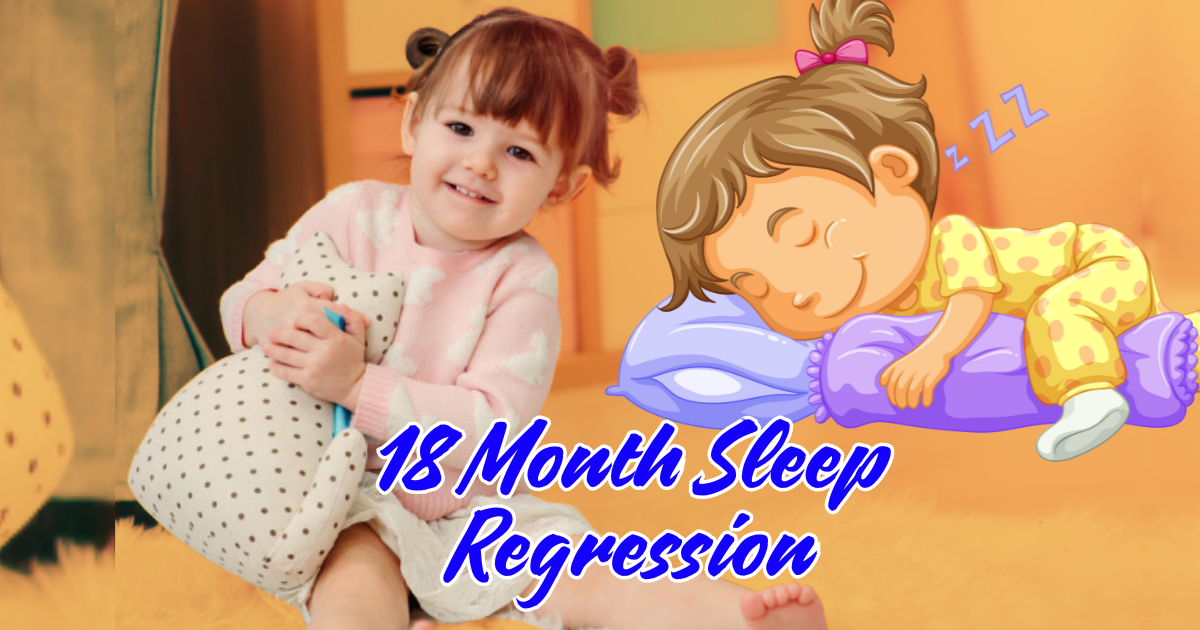Parenting comes with its fair share of joys and challenges, but one of the most perplexing phases many parents face is the 18-month sleep regression. Your toddler may have been sleeping well for months, and then suddenly, nighttime becomes a struggle filled with frequent wake-ups, fussiness, and difficulty falling asleep. This phase, while exhausting, is completely normal and usually signals developmental changes in your little one.
In this comprehensive guide, we’ll explore 7 powerful ways to manage the 18-month sleep regression, covering everything from common signs to proven strategies for helping your child (and yourself) through this tough period.
What is 18 Month Sleep Regression?
Sleep regression refers to a temporary disruption in your child’s sleep patterns, often marked by increased wakefulness, trouble falling asleep, or refusing naps. At 18 months, toddlers typically hit a significant developmental milestone that affects their sleep, making this particular regression more challenging than earlier ones.
Understanding Sleep Regression
Sleep regressions can occur at various stages during a child’s first few years of life, typically at 4 months, 9 months, and then again around 18 months. While frustrating for parents, this regression usually lasts a few weeks, after which sleep typically returns to normal.
The 18-month sleep regression is characterized by your child’s growing independence, new skills, and increased awareness of the world around them. These factors often interfere with their ability to settle into sleep.
Common Signs of 18 Month Sleep Regression
Identifying the signs of the 18-month sleep regression is key to addressing it effectively. If your toddler’s sleep routine has suddenly been thrown off, here are some common signs that sleep regression could be the cause:
1. Frequent Night Wakings
One of the most obvious signs of a sleep regression is your toddler waking up more often during the night. Previously, they may have slept through the night, but now, they wake frequently, often upset and unable to fall back asleep on their own.
2. Trouble Falling Asleep
Another common sign is difficulty falling asleep at bedtime. Your toddler may resist going to bed, taking much longer than usual to settle down. They might demand more attention or comfort from you, making bedtime a challenge.
3. Increased Fussiness and Crankiness
During the day, you might notice your toddler is fussier or more irritable than usual. This crankiness is often linked to poor sleep at night or an inability to nap well during the day.
4. Skipping or Refusing Naps
At 18 months, many toddlers start to transition to one nap per day, but during a sleep regression, they may refuse to nap altogether or struggle to stay asleep during naptime.
5. Clinginess or Separation Anxiety
Your child may become more clingy, wanting to be near you at all times. Separation anxiety tends to peak around 18 months, and this can exacerbate sleep troubles, as your toddler may cry when left alone in their crib.
Why Does Sleep Regression Happen at 18 Months?
The 18-month sleep regression is triggered by several factors, most of which relate to your child’s rapid developmental growth. While these milestones are exciting, they can also disrupt your toddler’s sleep. Here are some common causes of the 18-month sleep regression:
1. Cognitive Development
At 18 months, toddlers experience a surge in cognitive development. They are becoming more aware of their surroundings, learning new words, and developing problem-solving skills. This mental growth can lead to overstimulation, making it harder for your child to wind down at bedtime.
2. Physical Growth and Milestones
Many toddlers are learning to walk, run, and climb at this stage, which may excite them to the point that they resist sleep. Physical growth spurts can also contribute to discomfort during the night, causing them to wake more frequently.
3. Increased Independence
Your toddler is likely asserting more independence at this stage, which can translate into defiance at bedtime. They may refuse to go to bed because they want to stay up and play or test the boundaries you’ve set.
4. Separation Anxiety
Around 18 months, separation anxiety can peak, leading to a reluctance to sleep alone. Your child may want extra comfort and reassurance from you during this period, making it harder for them to fall asleep on their own.
5. Teething or Illness
Teething is another factor that can interrupt sleep. If your toddler is cutting new teeth, they may wake frequently due to discomfort. Similarly, common childhood illnesses like colds or ear infections can disrupt sleep patterns during this time.
How to Manage 18 Month Sleep Regression: Effective Tips for Parents
Dealing with sleep regression can feel overwhelming, but there are several strategies that can help you and your toddler get through it. Here are some effective tips for managing 18-month sleep regression:
1. Stick to a Consistent Bedtime Routine
One of the most important things you can do during sleep regression is to stick to a consistent bedtime routine. Having a predictable routine, such as bath time, reading a story, and quiet cuddles before bed, helps signal to your toddler that it’s time to wind down and sleep.
2. Offer Comfort, But Avoid Over-Reinforcing Night Wakings
It’s natural to want to comfort your toddler during night wakings, but try to avoid creating habits that encourage more night-time disruptions. Offer reassurance without fully engaging with your child—pat their back, give them their favorite toy, and leave the room to help them self-soothe.
3. Adjust Nap Times
If your toddler is transitioning to one nap a day, you may need to experiment with the timing of naps to ensure they’re not too tired or too awake at bedtime. Avoid late afternoon naps that can interfere with their nighttime sleep.
4. Encourage Self-Soothing
Helping your child learn how to self-soothe is critical during this regression. Allow them the opportunity to settle themselves back to sleep if they wake up. This will help reduce their dependence on you for comfort throughout the night.
5. Limit Screen Time Before Bed
Toddlers are sensitive to screen time, especially before bed. Exposure to screens, whether it’s a TV, tablet, or smartphone, can overstimulate your child’s brain and make it harder for them to fall asleep. Instead, opt for calm, quiet activities in the hour leading up to bedtime.
6. Address Separation Anxiety with Patience
Separation anxiety can cause significant sleep disruptions at this age. Reassure your child that you’re nearby by offering comfort during the day. At night, gradually reduce your presence in the room by offering a nightlight or allowing them to sleep with a favorite comfort object.
7. Stay Calm and Consistent
Consistency is key when dealing with sleep regression. Stick to your bedtime routine, remain calm, and resist the urge to give in to every request for comfort or attention. Patience and persistence will pay off as your toddler adjusts and begins to develop better sleep habits.
Creating a Better Sleep Environment for Your Toddler
The environment your toddler sleeps in plays a crucial role in helping them get through the 18-month sleep regression. A well-prepared and calming sleep environment can make a world of difference in how quickly they settle down for sleep.
1. Keep the Room Dark and Cool
Creating a dark and cool environment helps promote sleep by mimicking natural nighttime conditions. Use blackout curtains to block out any light and keep the temperature comfortable, ideally between 65°F and 70°F (18°C to 21°C).
2. Introduce White Noise
If your toddler is easily disturbed by outside noises, consider using a white noise machine. The consistent sound can help drown out disruptions and create a soothing environment for sleep.
3. Provide a Comfort Object
Many toddlers find comfort in having a favorite blanket or stuffed animal in bed with them. This comfort object can offer reassurance, especially if separation anxiety is contributing to their sleep difficulties.
When to Seek Professional Help
While most toddlers will naturally grow out of the 18-month sleep regression, some may experience prolonged sleep difficulties that require professional intervention. If your toddler’s sleep issues persist for more than 4-6 weeks, or if they are showing signs of extreme distress or daytime sleepiness, it might be time to consult a pediatrician or a pediatric sleep specialist.
Some issues that may require professional help include:
- Chronic night wakings that disrupt family life.
- Ongoing sleep refusal despite maintaining a consistent routine.
- Concerns about your child’s overall health and well-being.
A sleep specialist can help identify any underlying issues that might be affecting your child’s sleep, such as sleep disorders or other health concerns, and offer personalized solutions.
Conclusion: The Importance of Patience and Consistency During the 18 Month Sleep Regression
The 18-month sleep regression can be a difficult and frustrating time for parents, but it’s also an important developmental phase for your toddler. While it may feel overwhelming in the moment, it’s essential to remain patient and consistent. With time, the sleepless nights will pass, and your child will return to a more regular sleep pattern.
Remember, maintaining a consistent bedtime routine, creating a calming sleep environment, and offering comfort when needed are key strategies for managing this phase. By following the 7 powerful tips outlined in this guide, you can help your toddler navigate this regression and eventually regain a healthy sleep routine. And in the meantime, take care of yourself—sleep regressions are challenging, but they won’t last forever.
FAQs About 18 Month Sleep Regression
- How long does the 18-month sleep regression last?
- The 18-month sleep regression typically lasts between 2-6 weeks, depending on your child’s development and how consistent you are with managing the disruption.
- Is it normal for my 18-month-old to wake up more at night?
- Yes, frequent night wakings are a common symptom of the 18-month sleep regression. This phase is usually temporary and improves over time.
- Can teething make the 18-month sleep regression worse?
- Yes, teething can add to the difficulty of sleep regression. Toddlers often experience discomfort from teething, which can lead to increased night wakings.
- How do I know if my child is experiencing sleep regression?
- Common signs include frequent night wakings, increased clinginess, resisting bedtime, and refusing naps. These disruptions often align with other developmental milestones.
- Should I adjust my toddler’s nap schedule during sleep regression?
- Yes, you might need to adjust their nap schedule to ensure they’re not overtired or under-tired at bedtime. Avoid late afternoon naps to prevent interference with nighttime sleep.
- What is the best bedtime routine during sleep regression?
- A calming routine with consistent activities like a bath, reading, and quiet time can signal to your toddler that it’s time to sleep. Stick to the same routine every night.
- Is screen time before bed affecting my toddler’s sleep?
- Yes, screen time can interfere with your child’s ability to wind down for sleep. It’s best to limit screens at least 1 hour before bedtime to prevent overstimulation.
- Should I let my child cry it out during sleep regression?
- While some parents choose the cry-it-out method, it’s important to balance offering comfort without reinforcing bad sleep habits. Gradual self-soothing techniques are often more effective.
- Can separation anxiety affect sleep at 18 months?
- Yes, separation anxiety often peaks around 18 months and can make it harder for your child to sleep independently. Offering reassurance while encouraging self-soothing can help.
- When should I see a doctor for sleep issues?
- If your toddler’s sleep issues persist for more than 6 weeks or seem unusually severe, consult a pediatrician or sleep specialist for additional guidance.




